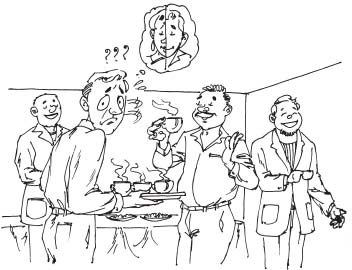
It is often not realized that punctuation is a very important part of good prose. It prompted Lynne Truss, who presented a popular series on punctuation on BBC Radio 4, to write a best-selling book on the subject titled Eats, Shoots and Leaves. The title is a little intriguing, but it is based on a joke published originally, I think, in Reader’s Digest long back. The joke goes like this:
A panda walks into a café. He orders a sandwich, eats it, then draws a gun and fres two shots in the air.
“Why?” asks the confused waiter, as the panda makes towards the exit. The panda produces a badly punctuated wildlife manual and tosses it over his shoulder.
“I’m a panda,” he says at the door. “Look it up.”
The waiter turns to the relevant entry and, sure enough, finds an explanation.
“Panda. Large black-and-white bear-like animal, native to China. Eats, shoots and leaves.”

The English professor slipped his arm around the waist of the comely housemaid just as his wife entered the room. “Really, Gopal,” she exclaimed, “I am surprised at you.”
“To the contrary, my dear,” he corrected, “It is we, who are surprised. You are astonished.”


The school manager and the principal did not carry on well and tried to run each other down to the detriment of school discipline. One day, the manager wrote on a class blackboard: “The manager says the principal is a fool.” The principal did not take it lying down. He just inserted commas in the sentence to read: “The manager, says the principal, is a fool.”

This is true—believe it or not. There was once a professor of… (no, I won’t tell you) whose English sometimes went for a six. Some of his isms:
“I think my room is lighter than yours.”
“You can sleep over my wife; I am taking the other berth.” You know what he meant actually.

In West Bengal, teaching in English in the middle school was discontinued decades back and has been reintroduced only lately, and so the teachers are struggling with the new subject. The following conversation was overheard recently in a school:
“Who is the headmaster?”
“I is the headmaster.”
“So, you are the headmaster.”
“Yes, I are the headmaster.”

A brash new lecturer in English was bragging about his power with words. He boasted he could reel out synonyms of any word.
A senior deflated his ego by asking: “Tell me another word for thesaurus.”

Some school students in Bihar were vying over, who was most patriotic. Said one: “I never use imported goods.” Another said: “I never see foreign movies.” The third averred: “I have never passed English since I started school.”
(The conversation, of course, was in Bhojpuri Hindi.)

These days, there is a rush to learn English. One Bihari boy memorized a few phrases from an etiquette book. When a cup of tea was handed to him at a party, he responded: “Thank you, sir or madam, as the case may be.”


Recently, I had another encounter with malapropism. The principal of the women’s college commiserating with a girl with a badly burnt face said, “Don’t worry, dear, with cosmic surgery, the scars will disappear.”

The class was given to write an essay on ‘Comparing the joys of youth and old age’. A pupil wrote: “Great are the pleasures of youth, but nothing as compared to the pleasures of adultery.”

The English teacher was in labour with her first child when she suddenly started shouting: “Can’t, won’t, don’t, didn’t, doesn’t, couldn’t, wouldn’t, shouldn’t….”
Perplexed, the nurse asked: “Doctor, what’s wrong with the patient?”
“Oh! she’s having contractions,” reassured the doctor.

Reverend William A. Spooner of New College, Oxford, had the habit of transposing the initial sounds of two or more words while speaking, often to humorous effect—from which was coined the word, spoonerism. On one occasion, he chided a student, “You have hissed my mystery lecture.” And in disgust added: “You have tasted two werms.” Another one from him: “It is kisstomary to cuss the bride.”

Another girl wrote in her geography test:
“The climate is hottest at the creator.”

No, this didn’t happen in Bihar. It actually happened in Saugar University, Madhya Pradesh. On the first day of the session, a teacher took her English literature class and naturally lectured in English. Complained mournfully the class: “Hey, this Madam teaches English in English!”

The college garden was in full bloom in the winter, and the half-literate gardener boasted, “We have flowers of all colours of the rectum.”

A yokel from Patna had a windfall inheritance and started to have social ambitions. He joined an etiquette course to learn social graces. When a neighbour died, he went to console the family. As taught by the etiquette advisor, he commiserated, “She was not only your mother but was so good that the whole neighbourhood considered her their mother.” The teacher complemented him for being a good learner and he became very proud of his social accomplishments.
Later, the wife of a friend died. The man went to condole his friend. “I am very sorry to learn of your wife’s death. She was not only your wife but was considered the wife of us all.”


In an answer to a question on a sociology test, “Why did the population of Mumbai grow so rapidly?” A student wrote: “The population of Mumbai grew fast because of the large stork yard.”

When his daughter passed the high school examination in the first division, the neighbours came to felicitate her: “Consolations on your brilliant success.”

The magistrate asked the witness: “Who is making the allegation?”
A man stood up and said: “Sir, I am the alligator.”

A newspaper report:
“Adulterous references were made to the scientist, who did a pioneering work on water harvesting in the Bikaner district.”

A number of well-wishers, who called to condole the author Khushwant Singh when his mother died said they had come ‘to condone’ his mother’s death.

A news item:
The education minister has announced free education up to the muddle class.

A take on punctuation is provided by the actress, Katherine hepburn.
This is what she has to say: “I hate punctuating with full stops. They are so final like death. I use a dash instead of a full stop. And commas bother me. When I use one, I think I have stubbed my toes. However, I haven’t made up my mind about question marks.”

A kind of spoonerism is interposition of whole words. Such transposition of words is called metathesis and occurs not infrequently. “I am going to plant my water today.”
“I need to put these eyes thrice in the drops daily.”
